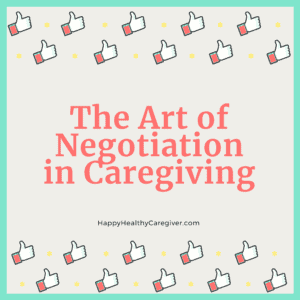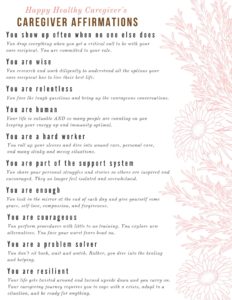This post is sponsored by LifeStation®. All opinions and statements are my own.
When we think of a negotiation, we usually think of making a large purchase, like a car or a home, or perhaps watching a nail-biting hostage situation on the big screen.
While caregiving can sometimes feel like we are being held hostage, we do have freewill to decide whether we will continue to show up for our loved ones. However, I believe we can use some of these same negotiation techniques to maintain a happy relationship with our care recipient.

Lessons from Dad
When I was in college, my dad gifted me a negotiation book that helped him much in his career. I must admit, I never read the book and do not think I even kept it. Lucky for me, I felt I got all the negotiation tactics I needed to survive by listening to and observing my dad.

In our small town’s glass manufacturing business, my dad climbed the corporate ladder. He negotiated his way through various promotions and accepted his largest promotion ever when I was in middle school. This is how my family ended up moving from our small town in Pennsylvania to the bustling suburbs of Atlanta.
Having been in the container business most of his life, my dad wrote his thoughts on his life’s experiences in a book called A Drop in the Bucket.

Shuttle Diplomacy
Dad first witnessed this technique in the 1970’s when the United States government officials were shuttling between Egypt and Israel trying to bring peace between the Arabs and the Jews. He describes shuttle diplomacy as mediated communication by a third party to convey information back and forth between two parties. The idea is that this intermediary can help these two parties navigate from conflict toward resolution.
In the early stages of caregiving, we may feel our loved one need more help than they do. For example, my mother in law insisted she could continue to drive long after my husband and I felt she should. Reflecting on this family conflict, we could have maybe asked her doctor, a trusted third party, to require an eye test. Other reliable individuals who may be good candidates for shuttle diplomacy include members of the faith community, hospice staff, or your care recipient’s hairdresser or best friend.
Don’t Make Spontaneous Decisions
Dad encouraged his children to sleep on a decision before officially making it. He felt giving a little more time to weigh the options could not hurt. He always recommended a written list of pros and cons so we could see the options in black and white. In the morning, we possessed a fresh perspective.
Similarly, we can use this methodology when a caregiving related conversation takes an unproductive path. Rarely do decisions need to be made spontaneously. Be bold and suggest tabling the conversation for another time giving each party a bit of time to reflect and think things over.
Return to the conversation later with a written list of your pros and cons – this displays how much thought and care you have put into the situation. Always start a potential tense conversation with your ‘why’. Usually your why comes from a place of love and concern.
Plant a Seed
Sometimes when you suggest something, you can run into resistance. Sprinkling tiny seeds can allow the other person to believe this is their idea. Sometimes asking a broad question about the topic may be enough.
Perhaps you are concerned about your loved one running errands on their own. You recently learned about LifeStation who offers an on the go device that your loved one could use if they find themselves needing help when out and about. Help could be just a button press away with this discreet mobile medical alert device with GPS.

You anticipate your loved one is going to resist the situation because they do not believe they need as much help as you think they do. One way to bring up the subject is to share a story about how this device was helpful to someone else. Maybe a week or so later, you let them know you are not sleeping well or feeling anxious because you worried about their safety. Brainstorm ideas together about how you can protect their freedom and respect their privacy while still getting the peace of mind you need for health reasons. Perhaps you can agree to use this device on a short-term basis before committing just to see what it is like.
Remember Names
If your memory is like mine, remembering names can be difficult. People appreciate when you remember their name and it can be a successful technique to use to get along with people better.
In caregiving, you will be in a good position for negotiations if you keep a log of all the people your loved one interacts with and a few other personal notes. I use my smartphone app for my quick notes since it is always with me. These key individuals may include the doctor’s receptionist, the nurse on duty, the next-door neighbors, and the professional care staff. When you need a favor or the inside scoop on a situation, these positive relationships will play to your advantage.
On the flip side, I also think these same individuals need to know more about your care recipient than just their name, particularly if your loved one is living in a senior community. Displaying photos, books, and other mementos where others can see them often help form more interpersonal connections.
When mom lived in her assisted living communities, we had a table near her favorite chair with a few of the Waddodles of Hollow Lake book series she wrote as well as a digital photo frame displaying family photos like a slideshow.
Ask for Too Much or Offer Too Little
This is one of my dad’s favorite mantras: Never be too embarrassed to ask for too much or offer too little. He lived this in every negotiation and encouraged all his children to do the same even when it felt uncomfortable. In other countries, haggling is the norm but in the United States we tend to prioritize politeness over our own needs. Because we implemented dad’s advice, I am certain we all got better deals when purchasing our homes and acquiring new careers.
Often the normal response when friends and family members as how we are doing or what they can do to help us, we simply say ‘I’m fine.’ I have been guilty of responding this way, too. Really?! We do not need any help and are not going crazy?! We are so conditioned to being polite that we continue to keep doing what we are doing. This is literally the definition of insanity. If we responded honestly to these questions, I believe our situations can begin to change. Let’s not leave these conversations empty handed. One practical suggestion I want share is to keep a running list on our smartphone of specific ways individuals can help us. Here is a short list to consider:
- Call or visit my loved one once a week (perhaps negotiate a specific day and time that works for both parties).
- Research a specific product or service you’ve been considering (i.e. Meals on Wheels, Medicare consultant, mobility aid, family caregiver app).
- Find a local caregiving support group.
- Mow the lawn or find and pay for someone who can.
- Double recipes when cooking to bring over.
One of the moments I recognized pride in dad’s eyes was when he accompanied me to buy my first car, a 1993 Honda Civic. He gave me many tips on the drive there but when we got in the room, I did all the talking. I often wonder if he is looking down from above and smiling with pride about the many negotiations my siblings and I have made with our mom in our caregiving journey. I like to think so.

.



